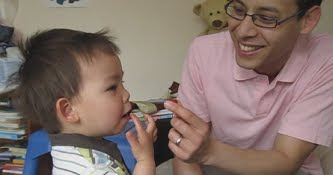The national dish of Brunei is nasi katok, which literally means 'knock rice'. The idea is that you knock on the door and get whatever is on offer, though now it seems to have become standardised as steamed rice with deep fried chicken. It's a basic dish that you can get in most simple restaurants.
The Standard Malay for 'knock' is ketuk, as in mengetuk pintu rumah 'knock on the door of the house' (from an article on page 3 of today's Media Permata).
So where does katok come from? First, Brunei Malay only has three vowels rather than the six vowels of Standard Malay; so the vowel in the first syllable is /a/ rather than the /ə/ of Standard Malay (which is represented by the letter 'e').
Then, for the second syllable. In Malay, /u/ in a closed final syllable tends to have a centralised realisation that we can represent as [ʊ]. For example, the vowel in the two syllables of duduk ('sit') sound quite different, and we can show the actual pronunciation of this word as [dudʊk]. So, in fact, using 'o' to represent the vowel in the second syllable of katok is not so surprising after all.
Dialectometry
7 hours ago










